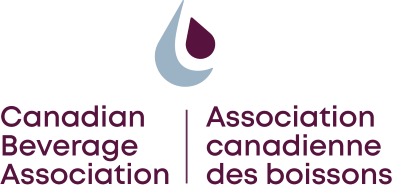"This has been tried in other jurisdictions and it has failed. It didn't reduce obesity. It increased the price of groceries, and resulted in job losses in the food and beverage sector."
– Jim Goetz, President, Canadian Beverage Association
OTTAWA, Mar. 1, 2016 /CNW/ - On behalf of the 60,000 beverage industry employees across Canada, the Canadian Beverage Association (CBA) supports the ongoing efforts of the Canadian Federal and Provincial Governments to promote healthy lifestyles. However, CBA does not support taxes on our members' products as such measures have proven ineffective in achieving desired outcome, and would not reflect the continued reduction of beverage calories in Canada.
Consumers want factual information to help them make informed choices. A tax which isolates and targets some beverages as unique contributor to poor health – independent of all other sources of dietary sugar or calories – does not support overall better public health, and in fact can be misleading.
Beverages account for a very small portion of calories in the Canadian diet. According to the most recent, publicly available Canadian Community Health Survey - Nutrition1 data (2004) from Statistics Canada, soft drinks and fruit drinks accounted for only 4% of the average Canadians' daily calories. Over the past 10+ years since then, the beverage industry has noted that beverage calories consumed by Canadians has decreased by 20%.2 Today, due to lower consumption of soft drinks and increased consumption of no- and low-calorie beverages, we would anticipate that proportion of daily calories would be even lower. Our latest initiative, Balance Calories, takes our commitment to providing proactive solutions to ambitious new levels, with a goal to further reduce per capita beverage calories by another 20% by 2025.
Calls for measures such as taxation or labelling are a response to concerns about increasing incidence of obesity and resulting health concerns; however, it is important to note that obesity has continued to rise steadily over the past 20 years, while consumption of sugar-sweetened beverages, and beverage calories overall, has been declining over the same period.
Two recent international examples demonstrate that taxation is not an effective tool. Studies regarding a food and beverage tax introduced in Mexico indicate the decline in consumption of sugar-sweetened beverages was less than 0.5% of overall calorie intake,3,4 between 5 and 10 calories per day in an average Mexican diet of 3,024 calories. In 2011, Denmark enacted a tax on certain foods and beverages, but abandoned the tax a little over a year later citing lost jobs, increased prices for consumers, an increase in cross-border shopping, and increased administrative costs.5
Nearly a decade ago, CBA members adopted global marketing standards that prevent marketing of beverages other than water, 100% fruit or vegetable juice, and milk to children under the age of 12. Many beverage companies also participate in the Canadian Children's Food and Beverage Advertising Initiative, which further limits marketing to children. The success rate of these programs is 100% in almost all categories.6
Canada's beverage companies already voluntarily provide a clear calorie label on the front of all of our products, in addition to what Health Canada requires as part of food labelling requirements, which includes the nutrition facts table and principle display panel labelling. With our Balance Calories initiative, we are working toward a goal of reducing beverage calories in the Canadian diet. This is a meaningful initiative that will have significant real-world impact in helping people reduce their consumption of calories and sugar from beverages.
The Canadian Beverage Association and our members believe that all stakeholders, including industry, government, and not-for-profit health organizations, play a role in developing workable solutions to serious health issues. Solutions put forward must reflect the diet and lifestyle of Canadians, and research from a wide range of sources.
The Canadian Beverage Association is the national trade association representing the broad spectrum of companies that manufacture and distribute the majority of non-alcoholic refreshment beverages consumed in Canada. Over 60,000 Canadians are employed directly, indirectly and through induced jobs in the Canadian beverage industry.
________________________________
1 Data compiled from Chart 2 and Table 4 of the Nutrition: Findings from the Canadian Community Health Survey – Canadians' Eating Habits 2004; Statistics Canada Catalogue no. 82-620-MIE — No. 2; July 2006
2 Source: Canadean www.canadean.com
3 Aguilar Arturo, Gutiérrez E., Seira E. Taxing calories in Mexico. Centro de Investigación. Económica, Instituto Tecnológico Autónomo de México, 2015. http://cie.itam.mx/sites/default/files/cie/15-04.pdf Research supported by ConMexico
4 Colchero M Arantxa, et al. Beverages purchases from stores in Mexico under the excise tax on sugar sweetened beverages: observational study. The British Medical Journal, 2015. http://www.bmj.com/content/352/bmj.h6704
5 The Proof of the Pudding, Institute of Economic Affairs http://www.iea.org.uk/publications/research/the-proof-of-the-pudding-denmark%E2%80%99s-fat-tax-fiasco
6 Based on research presented by Monique Potvin Kent, PhD, Professor, Interdisciplinary School of Health Sciences, University of Ottawa at the 2014 CDPAC conference the beverage industry has reduced their advertising on children's television stations to zero. According to 2012 compliance numbers measured by Canada Canadian Children's Food and Beverage Advertising Initiative, as an industry we are at:
- 99% compliance for TV advertising
- 100% for print advertising
- 100% for internet advertising
- 100% compliance for company-owned 3rd party websites and video
SOURCE Canadian Beverage Association
Image with caption: "In Canada, over the past decade there has been a decline in consumption of sugar-sweetened beverages, at the same time that rates of obesity and diabetes have continued to rise. SOURCE: Source for obesity and diabetes rates: Statistics Canada. NOTE: Statistics Canada reports the number of persons with diabetes as totals that include both Type 1 and Type 2 diabetes. To isolate type 2, this graph shows annual totals representing 90% of all Canadian diabetics, per information from Canadian Diabetes Association website that 90% of new diabetes diagnoses annually are 'adult-onset' type 2 diabetes. Source for sugar-sweetened beverage consumption: Canadean www.canadean.com (CNW Group/Canadian Beverage Association)". Image available at: http://photos.newswire.ca/images/download/20160301_C3727_PHOTO_EN_632763.jpg

please contact Lindsey McCulloch, 416-362-2424, [email protected]

Share this article